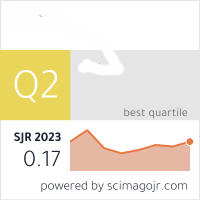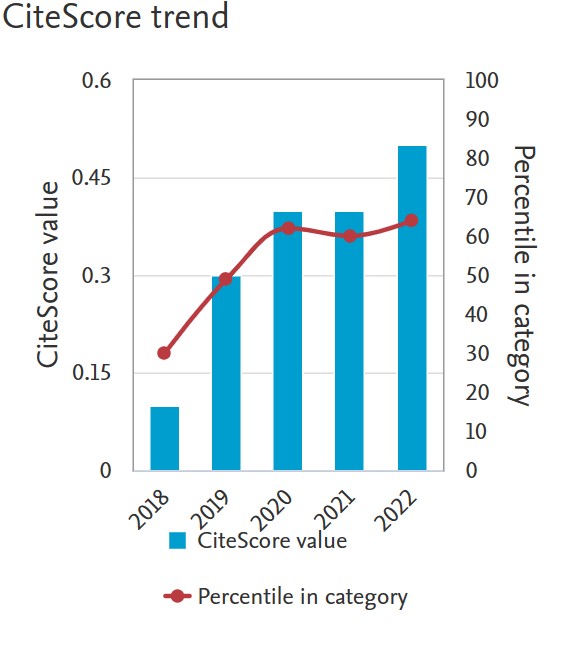The SARS-CoV2 effect on renal function in patients after recovery from COVID-19
Keywords:
COVID-19, Creatinine, Renal, SARS-CoV-2, Urea.Abstract
Objective: SARS-CoV-2 infects the kidneys through Angiotensin Converting Enzyme 2 (ACE2), which is overexpressed in comparison to some other organs. Thus, leads imbalance of renal function. Methods:
his study involved four groups (G1: Healthy group, G2:Cardiovascular illness group, G3: Respiratory illness group, And G4: recovery from COVID-19 group). Collected blood samples from the COVID-19 epidemic center in Salah Al-din general hospital, with confirmed recovery from COVID-19. Results: The findings of this study demonstrated a significant difference in urea and creatinine concentrations in the G2 and G3 groups compared to the Healthy group in both genders. But the no statistical significance between G4 and Healthy group. and the other hand found a low significance in the concentration of potassium in G2, and G3 compared with the Healthy group in both genders. While showing a high significance in the concentration of potassium in the G4 compared with the Healthy group in males, but no significance in G4 in females. Conclusion: The renal disorders in patients after recovery from COVID-19, can lead to renal damage and impaired function. Maybe the reason is due to the SARS-CoV2 effect on renal epithelial cells and proximal tubule damage.
Downloads
References
Cheng, Y., Luo, R., Wang, K., Zhang, M.,
Wang, Z., Dong, L., and Xu, G. (2020).
Kidney disease is associated with in-
hospital death of patients with COVID-
Kidney international, 97(5), 829-838.
Post, A., den Deurwaarder, E. S., Bakker, S. J., de
Haas, R. J., van Meurs, M., Gansevoort, R. T.,
and Berger, S. P. (2020). Kidney infarction in
patients with COVID-19. American Journal of
Kidney Diseases, 76(3), 431-435.
Lauer, S. A., Grantz, K. H., Bi, Q., Jones, F.
K., Zheng, Q., Meredith, H. R., and
Lessler, J. (2020). The incubation period
of coronavirus disease 2019 (COVID-19)
from publicly reported confirmed cases:
estimation and application. Annals of
internal medicine, 172(9), 577-582.
Liu, Y. M., Xie, J., Chen, M. M., Zhang, X.,
Cheng, X., Li, H., and Li, H. (2021). Kidney
function indicators predict adverse outcomes
of COVID-19. Med, 2(1), 38-48.
Wang, M., Xiong, H., Chen, H., Li, Q., and
Ruan, X. Z. (2021). Renal injury by
SARS-CoV-2 infection: a systematic
review. Kidney Diseases, 7(2), 100-110.
Huang, C., Wang, Y., Li, X., Ren, L., Zhao,
J., Hu, Y., and Cao, B. (2020). Clinical
features of patients infected with 2019
novel coronavirus in Wuhan, China. The
lancet, 395(10223), 497-506.
Hirsch, J. S., Ng, J. H., Ross, D. W., Sharma,
P., Shah, H. H., Barnett, R. L., and
Northwell COVID-19 Research
Consortium. (2020). Acute kidney injury
in patients hospitalized with COVID-
Kidney international, 98(1), 209-218.
Hong, X. W., Chi, Z. P., Liu, G. Y., Huang, H.,
Guo, S. Q., Fan, J. R., and Zhang, Y. H. (2020).
Characteristics of renal function in patients
diagnosed with COVID-19: an observational
study. Frontiers in medicine, 7, 409.
Pranata, R., Soeroto, A. Y., Huang, I., Lim, M.
A., Santoso, P., Permana, H., and Lukito, A.
A. (2020). Effect of chronic obstructive
pulmonary disease and smoking on the
outcome of COVID-19. The International
Journal of Tuberculosis and Lung
Disease, 24(8), 838-843.
Pranata, R., Supriyadi, R., Huang, I.,
Permana, H., Lim, M. A., Yonas, E., andLukito, A. A. (2020). The association between chronic kidney disease and new onset renal replacement therapy on the outcome of COVID-19 patients: a meta-
analysis. Clinical Medicine Insights:
Circulatory, Respiratory and Pulmonary Medicine, 14, 1179548420959165.
Zhang, Y., Xiao, M., Zhang, S., Xia, P., Cao,
W., Jiang, W., and Zhang, S. (2020).
Coagulopathy and antiphospholipid
antibodies in patients with Covid-19. New
England Journal of Medicine, 382(17), e38.
Wang, Q., Zhang, Y., Wu, L., Niu, S., Song,
C., Zhang, Z., and Qi, J. (2020).
Structural and functional basis of SARS-
CoV-2 entry by using human
ACE2. Cell, 181(4), 894-904.
Tezcan, M. E., Gokce, G. D., Sen, N.,
Kaymak, N. Z., and Ozer, R. S. (2020).
Baseline electrolyte abnormalities would
be related to poor prognosis in hospitalized
coronavirus disease 2019 patients. New
Microbes and New Infections, 37, 100753.
Chen, D., Li, X., Song, Q., Hu, C., Su, F.,
Dai, J., and Zhang, X. (2020).
Hypokalemia and clinical implications in
patients with coronavirus disease 2019
(COVID-19). MedRxiv.
Downloads
Published
Issue
Section
License
You are free to:
- Share — copy and redistribute the material in any medium or format for any purpose, even commercially.
- Adapt — remix, transform, and build upon the material for any purpose, even commercially.
- The licensor cannot revoke these freedoms as long as you follow the license terms.
Under the following terms:
- Attribution — You must give appropriate credit , provide a link to the license, and indicate if changes were made . You may do so in any reasonable manner, but not in any way that suggests the licensor endorses you or your use.
- No additional restrictions — You may not apply legal terms or technological measures that legally restrict others from doing anything the license permits.
Notices:
You do not have to comply with the license for elements of the material in the public domain or where your use is permitted by an applicable exception or limitation .
No warranties are given. The license may not give you all of the permissions necessary for your intended use. For example, other rights such as publicity, privacy, or moral rights may limit how you use the material.











